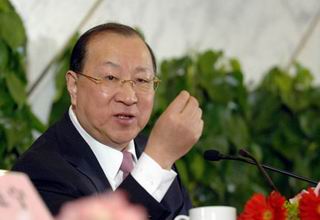China
Tax law not to dampen investment interest
Source: China Daily | 03-09-2007 11:46
Special Report: 2007 NPC & CPPCC sessions |
Finance Minister Jin Renqing speaks at a press conference in Beijiing March 9, 2007. He said the unified corporate income tax rate for domestic and foreign-funded enterprises would not dampen foreign investors' enthusiasm in their China investment. [Xinhua]
The draft corporate income tax law is unlikely to cause a big financial burden to overseas-funded firms, or dampen their investment enthusiasm, said Finance Minister Jin Renqing Friday.
The draft bill, which has been submitted to the National People's Congress, China's parliament, planned to unify the rate on domestic and overseas-funded companies at 25 per cent. Under the current laws, the domestic firms are subject to a 33 per cent rate while their overseas counterparts pay 25 per cent.
However, the draft offered a special treatment of 15 per cent rate for high-tech companies, said Jin on the sidelines of annual session of the parliament.
The minister revealed that the draft gave special consideration to Taiwan, Hong Kong and Macao funded companies.
"Given that most of, roughly 60 per cent, the Taiwan, Hong Kong and Macao funded companies are relatively small in scale, the draft specifically set a rate of 20 per cent for small and low-profit enterprises," said Jin.
"As a result, a very limited number of enterprises will experience a hike to 25 per cent from 15 per cent," said the minister.
Moreover, a preferential grace period was incorporated in the draft, according to Jin. For small companies, the increase to 20 per cent from 15 per cent can be phased in during a course of five years, meaning a rise of just one per cent per year, he elaborated.
The overseas firms are expected to pay 43 billion more in tax in an increase to 25 per cent from 15 per cent, Jin estimated. However, considering the granting of the five-year grace period, the burden will increase just 8 billion per year, said he.
Therefore, he concluded that this, out of their rich profit, would not cause great influences on them or dampen their interest in investing in China.
If passed, the law will be effective from January 1 next year, giving the overseas firms a transition period, noted Jin.
Editor:Du Xiaodan



